Canadians want Canada to be seen as determined to fight climate change, producers of sustainable products, and increasingly associated with renewable energy
December 11, 2020
In the latest round of survey work by Clean Energy Canada and Abacus Data, two out of three people in Canada (68%) think Canadians are currently seen in the rest of the world as people “who are determined to help combat climate change” while only 32% think our image is of “people who lack the will to change and protect the planet”. Fully 83% would like us to be seen as “determined to help combat climate change”, while 17% would prefer we be seen as unwilling to act.
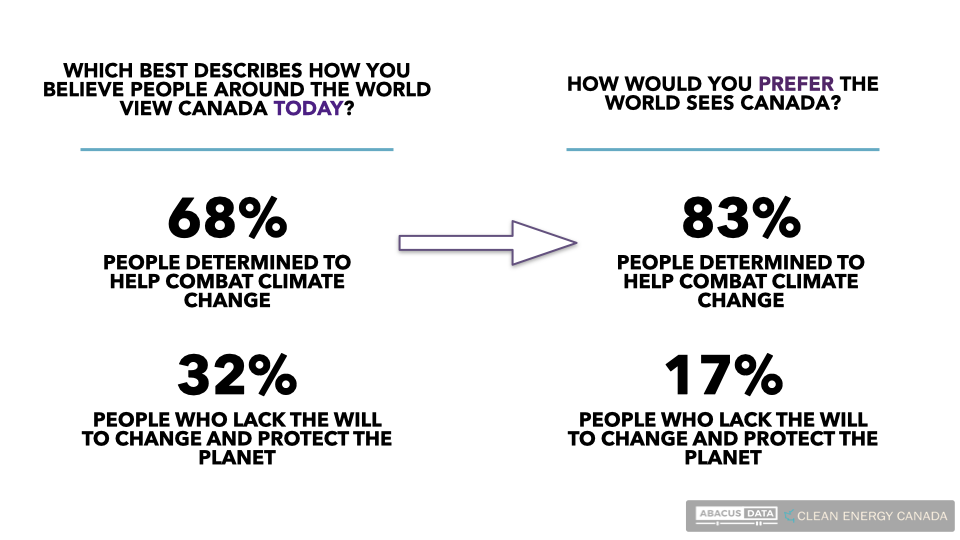
Three out of four (75%) think we are seen as “producers of goods that come with good sustainability credentials” while 25% think we are seen as people who make products to weak sustainability standards. Again, 83% would like us to be seen as makers of sustainably produced products.
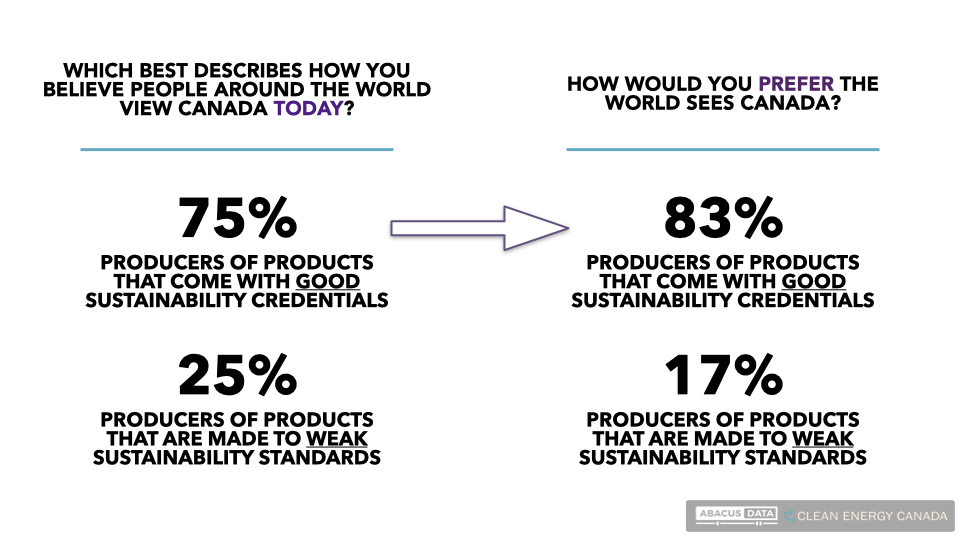
Today, 77% of Canadians think our country is seen as “highly dependent on oil and gas” while 76% would like to see a change and would prefer Canada be seen as “an economy that runs on renewable energy”.
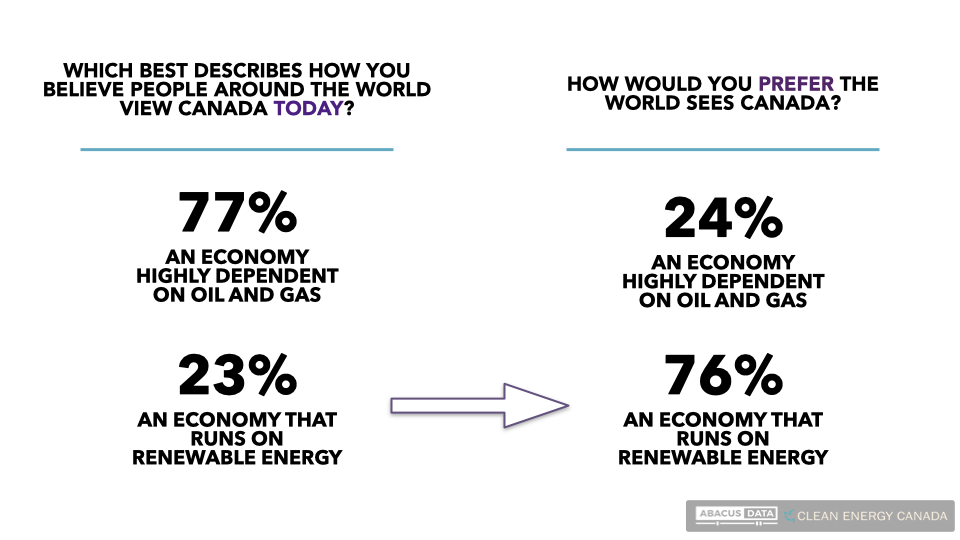
Finally, the vast majority of Canadians support the idea of a national effort to promote sustainably made Canadian industrial products around the world, to ensure that Canadian workers benefit from a shift to a lower-carbon economy.”

These results are part of a national survey that has revealed a sweeping conviction among Canadians that the world is shifting towards decarbonization and a very broad conviction that Canada should compete to win investment and jobs in that context.
On each of these items noted in this release, opinion is highly consistent across generations, regions and regardless of political affiliation. Conservative voters and Albertans are more split on whether they want Canada seen as an economy that runs on renewable energy, but a majority in both cases would prefer that image for the country. Fully 81% in Alberta and 77% of Conservative voters want Canadians to be seen as people who are determined to help combat climate change.
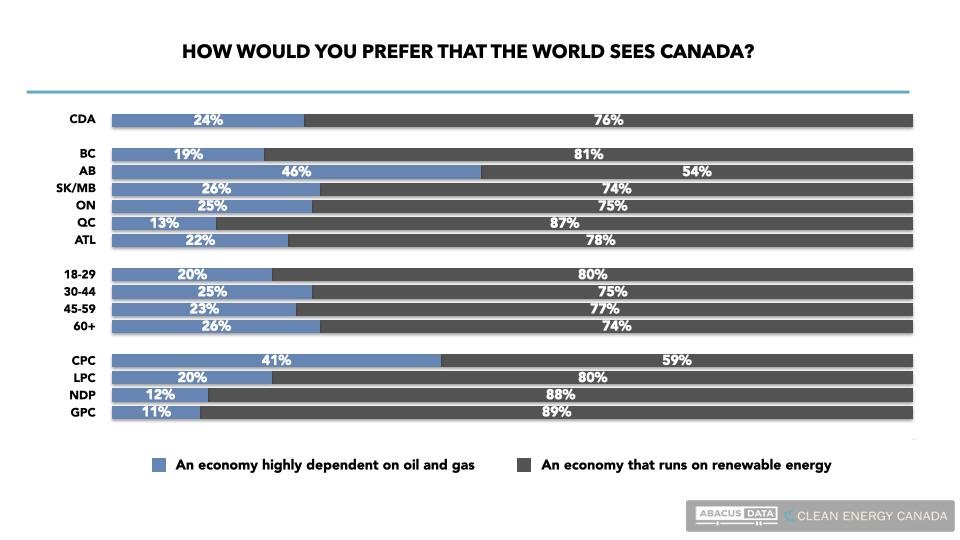
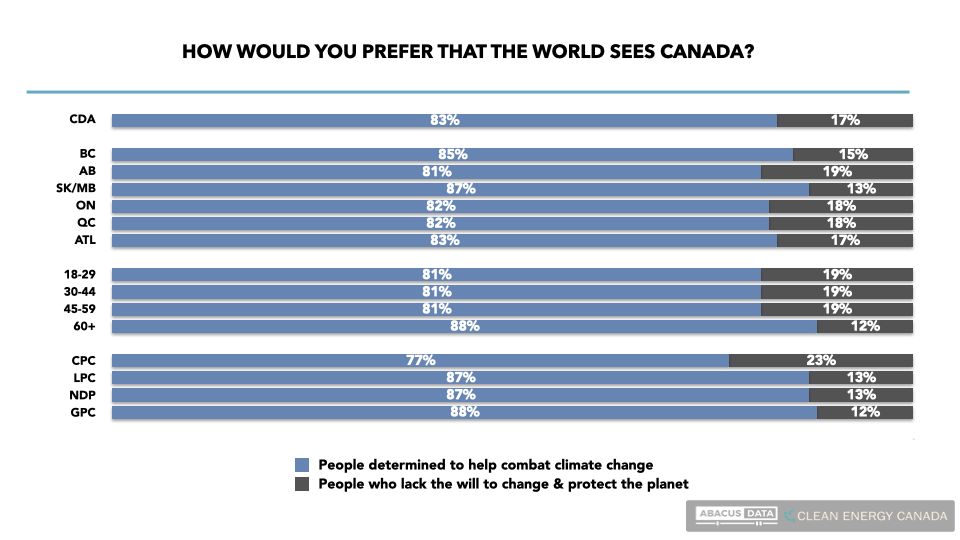
UPSHOT
According to Bruce Anderson: “Shifting to a cleaner economy is broadly seen as desirable and inevitable and once-deep resistance among Conservative voters and Albertans seems to be dissipating. Across Canada, the desire is for our country to be seen as a place that does its share to fight climate change, produces products to high standards of sustainability and Canadians also like the idea of marketing our products to the world with these credentials front and centre. This debate has shifted rapidly and a climate plan is increasingly viewed as central to an economic plan for the future.”
According to Merran Smith, Clean Energy Canada’s executive director: “A year into this new decade, climate action is the clear Canadian consensus, full stop. It’s a moral responsibility Canadians believe we have, absolutely, but it also underpins the economy Canadians want and believe we need to compete abroad. And it’s the image Canadians want to see of themselves when they look in the mirror—or when they imagine the world looking at us.”
ABOUT ABACUS DATA
We are the only research and strategy firm that helps organizations respond to the disruptive risks and opportunities in a world where demographics and technology are changing more quickly than ever.
Find out more about what we are doing to help clients respond to the COVID-19 pandemic.
We are an innovative, fast-growing public opinion and marketing research consultancy. We use the latest technology, sound science, and deep experience to generate top-flight research-based advice to our clients. We offer global research capacity with a strong focus on customer service, attention to detail and exceptional value.
We were one of the most accurate pollsters conducting research during the 2019 Canadian Election.

Contact us with any questions.
Find out more about how we can help your organization by downloading our corporate profile and service offering.
METHODOLOGY
The survey was conducted with 1,419 Canadian adults from November 26 to December 1, 2020. A random sample of panellists was invited to complete the survey from a set of partner panels based on the Lucid exchange platform. These partners are typically double opt-in survey panels, blended to manage out potential skews in the data from a single source.
The margin of error for a comparable probability-based random sample of the same size is +/- 2.6%, 19 times out of 20.
The data were weighted according to census data to ensure that the sample matched Canada’s population according to age, gender, educational attainment, and region. Totals may not add up to 100 due to rounding.



